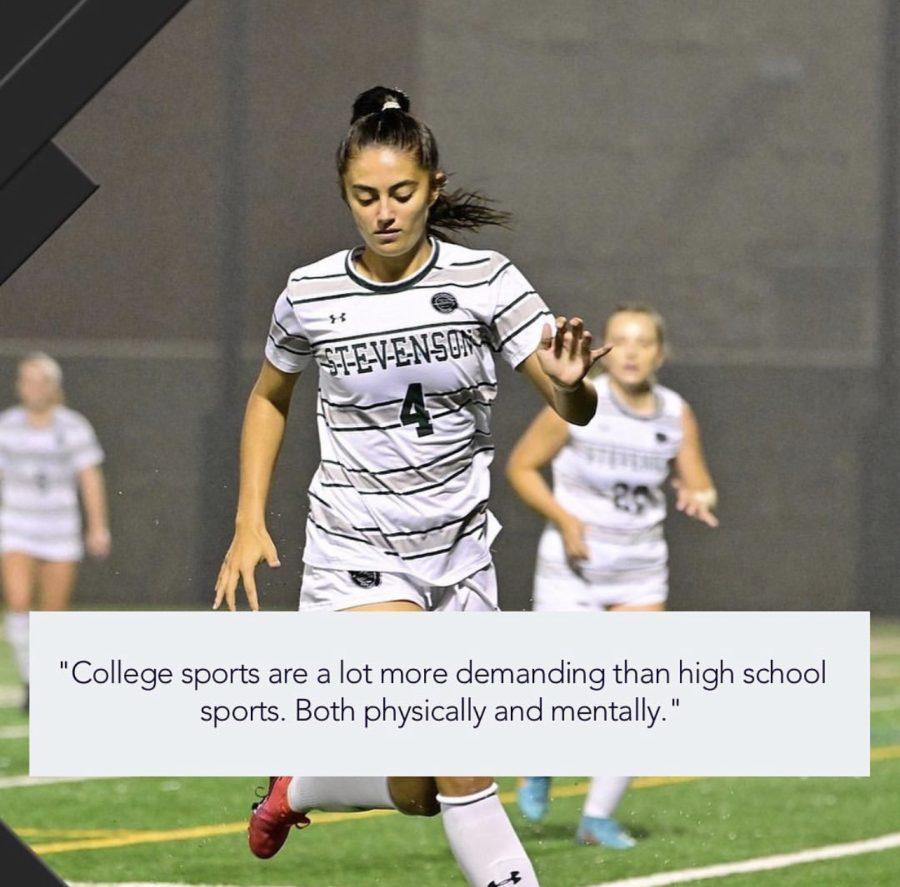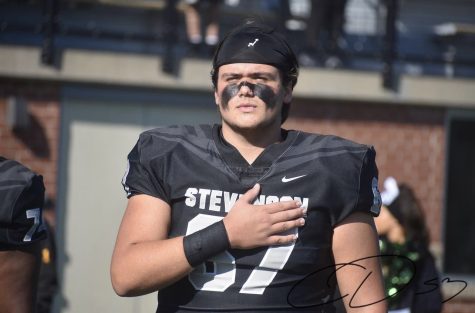Image

MUSTANGS FOR MENTAL HEALTH
‘Sometimes all you need to do for someone is listen.’
Micah Ernest, Doug Hines, and Brody Campbell, The Villager

Kylie DonBullian
Note: All three reporters for this story are also varsity athletes at Stevenson. Campbell is on the football team, while Ernest and Hines play on the men’s volleyball and beach volleyball teams.
Since the COVID-19 pandemic began, mental health issues have been steadily rising among student-athletes.
According to a 2022 study from the NCAA, student-athletes are reporting mental health issues at nearly twice the rate as prior to 2020 and the beginning of the pandemic. This study found that many student-athletes report feeling increasingly overwhelmed, hopeless, anxious, mentally exhausted, and in extreme cases, “so depressed it was difficult to function.”
Stevenson University student-athletes are no strangers to experiencing the same mental health struggles outlined by the NCAA’s study.
 James Moore (GoMustangSports.com)
James Moore (GoMustangSports.com)“Over my time here I’ve dealt with a handful of mental health problems,” football player James Moore said. “From getting depressed and homesick during my first year which led to struggles on the field and in the classroom to anxiety during high-stress weeks, which led to panic attacks and a whole store of other problems.”
The Maryland House of Delegates is proposing a solution that could potentially reverse the trend, though it won’t become law until next year at the earliest, and it can only mandate programs for public schools. Stevenson is a private university, but it recruits from both public and private high schools around Maryland and nearby states.
In January, Baltimore City Delegate Dalya Attar proposed a bill with this exact issue in mind. If passed, House Bill 375 mandates that every public school in the state with a mainstream athletic program provides mental health first-aid training for coaches.
Mental health first-aid training was defined by the House of Delegates in subsequent amendments to the bill as “recognizing and responding to indicators of mental illness and behavioral distress including depression, violence, trauma, youth suicide, substance abuse,” and more.
The bill has serious potential to be a step in the right direction for the mental health epidemic among student-athletes. It would provide modules to coaches and athletic staff about how to recognize mental health issues, how to address them, and arguably most importantly, how to get the student-athlete proper help with their issue, whether it be through the wellness center, a sports psychologist, or another on-campus resource.
Coaches across the state at all levels have spoken out mostly in favor of the state supplying mental health first aid training for coaches.
“The training piece would definitely be of value, at least in our program,” Stevenson football coach Ed Hottle said. “Most of the time, any conversations I have with athletes are ‘how can I get you help?’”
“Most of the time, any conversations I have with athletes are ‘how can I get you help?’”
Football coach Ed Hottle
House Bill 375 passed through multiple hearings and had its first Senate reading on March 29. However, the Maryland General Assembly ended its 2023 session in April before the bill could get another reading. It will be reintroduced again next year.
Attar’s legislative aide, Sandy Rosenbluth, will be providing updates to The Stevenson Villager staff on how students can lend support and encourage House Bill 375’s passing.
But the problem is greater than Maryland.
Student-athletes across the country have dealt with mental health problems that can be worsened by the pressures of daily life. Student-athletes not only have to balance the pressure of academics and maintaining grades, but also the rigorous schedule and life that comes with being an athlete.
With the statistics steadily increasing for the worse, there are a number of opportunities for potential solutions at SU and in Maryland. Outside of government legislation, as a Stevenson student or student-athlete, you too can take steps to combat the current mental health epidemic. Nearly one-fourth of all SU students are on a varsity athletics team.
One of the most important contributing factors to combat the national mental health crisis is raising awareness. Sophomore women’s soccer player Kylie DonBullian, has made it her goal to do just that by being an everyday advocate for mental health, becoming an ambassador for the mental health nonprofit Morgan’s Message Foundation, and organizing Stevenson’s first game dedicated to mental health awareness this past fall.

“I wanted to do this to raise awareness of mental health in student athletes because I feel like we really get looked over or shut down for struggling with mental health,” DonBullian said. “Student-athletes have this stereotype of being ‘perfect’ for balancing school, sports, socialization, and jobs, which is completely unfair and wrong.”
DonBullian wants her message to resonate with the Stevenson community and encourages fellow student-athletes to follow in her footsteps and work to remove the stigma surrounding mental health.
For DonBullian, all it took was reaching out to her coach who loved the idea and helped her make the mental health awareness game possible. For those interested in doing the same for a sport or organization, take DonBullian’s example and contact your coach or advisor to see what is possible to raise awareness and fight the stigma around mental health for yourself.
One consistent theme coming from student-athletes is the need for a sports psychologist.
“Even though we have the Wellness Center, it seems like our student athletes struggle a bit more trying to find resources according to our schedules,” DonBullian said. “I think having a sports psychologist would work wonders for the student-athlete community, especially having a sports focus.”
A sports psychologist is a licensed professional who supplies services for mental issues stemming from athletic performance or personal issues outside of an athlete’s sport.
Currently across Division I, II, and III athletics, only about 23% of universities have a staff sports psychologist. The results are even further skewed towards Division I programs which typically have more funds available to take on such a role.
As a Stevenson student-athlete, having those conversations with the athletic staff is a great way to bring attention to the issue and demonstrate a need for the position. Reach out to coaches, trainers, and even the athletic director to show interest in bringing on a staff sports psychologist.
If nothing else, be attentive and check in on how fellow peers or teammates are doing and always feel free to reach out to the Wellness Center with any mental health or general wellness concerns.
Hottle reminds us that “sometimes all you need to do for someone is listen.”